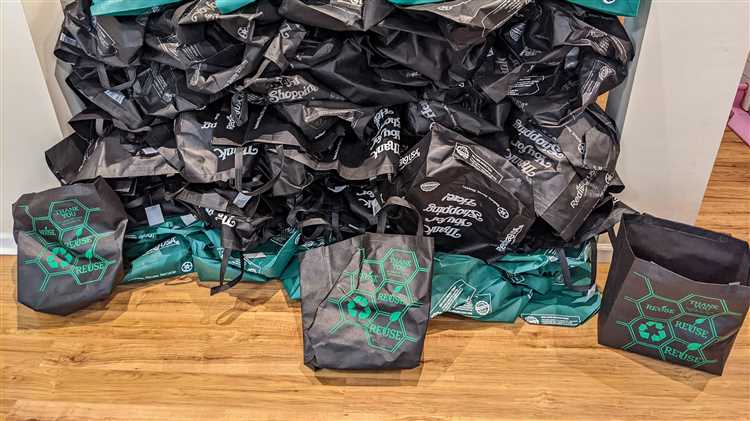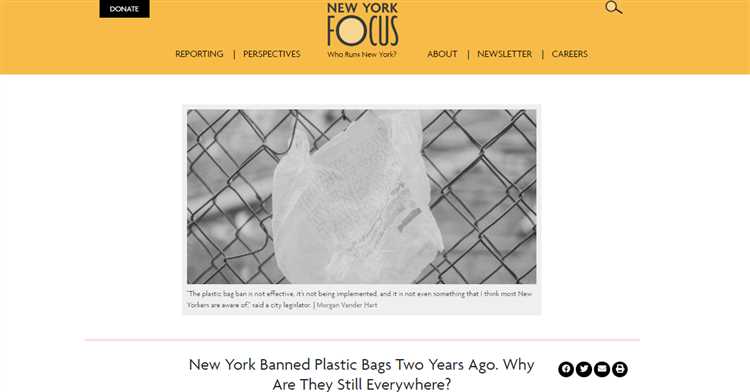Plastic bags have become one of the most pressing environmental issues of our time. These single-use bags are not only a major source of pollution, but also contribute to the global plastic crisis. In an effort to combat this problem, the state of New York has recently implemented a ban on plastic bags.
The decision to ban plastic bags in New York was driven by the detrimental effects they have on the environment. Plastic bags are non-biodegradable and can take hundreds of years to decompose. This means that once discarded, they will persist in the environment for a significant amount of time, polluting our land, waterways, and oceans. The ban aims to reduce the amount of plastic waste generated by encouraging consumers to use more sustainable alternatives.
Furthermore, the production of plastic bags has a significant carbon footprint. The process of extracting the raw materials, manufacturing, and shipping these bags releases greenhouse gases into the atmosphere, contributing to climate change. By banning plastic bags, New York is taking a proactive step towards reducing its carbon emissions and combating global warming.
Now that plastic bags are banned in New York, consumers have to find alternative ways to carry their groceries and other items. Reusable bags have emerged as a popular choice. These bags are typically made from durable materials such as canvas or recycled plastic, and can be used multiple times. They not only help reduce plastic waste, but also have a lower impact on the environment throughout their lifecycle. Moreover, some stores have introduced paper bags as a substitute for plastic bags. While paper bags are biodegradable, their production still requires resources and energy.
In summary, the ban on plastic bags in New York is a crucial step in the fight against plastic pollution and climate change. It aims to protect our environment by reducing plastic waste and carbon emissions. By encouraging the use of reusable bags and exploring alternative options, New York is leading the way towards a more sustainable future.
- Plastic Bags Usage in New York
- Environmental Impact of Plastic Bags
- 1. Marine pollution:
- 2. Landfill waste:
- 3. Carbon emissions:
- 4. Microplastic pollution:
- New York’s Plastic Bag Ban
- Alternatives to Plastic Bags
- 1. Reusable Bags
- 2. Paper Bags
- Question-answer:
- Why did New York ban plastic bags?
- What is the environmental impact of plastic bags?
- What alternatives are there to plastic bags?
- How will the ban affect consumers in New York?
- Are there any exemptions to the plastic bag ban?
- Why did New York ban plastic bags?
- What are the environmental impacts of plastic bags?
Plastic Bags Usage in New York
New York City has long been notorious for its extensive use of plastic bags. Before the ban, it was estimated that the city’s residents used over 10 billion plastic bags each year. These bags were commonly used for carrying groceries, takeout food, clothing, and other goods.
The high plastic bag usage in New York had significant environmental consequences. Many of these bags ended up in landfills or were littered on streets, parks, and waterways. Plastic bags are not biodegradable and can take hundreds of years to break down, contributing to long-term pollution. Furthermore, they pose a threat to wildlife, as animals often mistake them for food or become entangled in them.
In addition to the environmental impact, the production and disposal of plastic bags also have economic consequences. The manufacturing process of plastic bags from fossil fuels contributes to greenhouse gas emissions and uses valuable resources. The disposal of plastic bags requires large amounts of energy and creates additional waste management challenges.
Recognizing the need for action, New York implemented a statewide ban on plastic bags on March 1, 2020. Under this ban, single-use plastic bags are no longer provided by most retailers, including grocery stores, pharmacies, and convenience stores. Instead, consumers are encouraged to bring their own reusable bags or purchase paper bags for a small fee.
The ban aims to reduce the environmental impact of plastic bags by encouraging behavioral change among consumers and promoting the use of more sustainable alternatives. By eliminating the widespread usage of plastic bags, New York hopes to decrease pollution, conserve resources, and protect wildlife.
While some residents initially resisted the ban, there has been a shift in mindset as people become more educated about the environmental consequences of plastic bag usage. Many New Yorkers have embraced the use of reusable bags, which has become a symbol of their commitment to reducing waste and protecting the environment.
- Reusable bags are sturdier and more durable than plastic bags, making them better suited for carrying heavy items.
- They can be used for multiple shopping trips, reducing the need for single-use bags.
- Reusable bags come in various sizes and styles, allowing consumers to personalize their choices.
The ban on plastic bags in New York serves as a model for other cities and states looking to address the environmental impact of single-use plastics. By reducing plastic bag usage, New York is taking a significant step towards a more sustainable future.
Environmental Impact of Plastic Bags
Plastic bags are a major contributor to environmental pollution. Here are some of the ways in which plastic bags negatively impact the environment:
1. Marine pollution:
Plastic bags are often littered and end up in water bodies such as rivers and oceans. They pose a significant threat to marine life as animals can mistake them for food and ingest or get entangled in them. This can lead to injury, suffocation, and even death.
2. Landfill waste:

Plastic bags are not biodegradable, meaning they do not break down naturally over time. Instead, they accumulate in landfills and take hundreds of years to decompose. As a result, large amounts of plastic bags end up taking up valuable space in landfills and contribute to the growing waste problem.
3. Carbon emissions:
The production and transportation of plastic bags contribute to greenhouse gas emissions. The extraction of fossil fuels used to create plastic bags releases carbon dioxide into the atmosphere. Additionally, the manufacturing process itself produces emissions. These carbon emissions contribute to climate change and global warming.
4. Microplastic pollution:

Over time, plastic bags break down into smaller pieces called microplastics. These tiny particles end up in the soil and water, contaminating ecosystems and posing a threat to wildlife. Microplastics can be consumed by marine animals, entering the food chain and potentially ending up in human bodies.
To mitigate the environmental impact of plastic bags, it is crucial to reduce their usage and promote the adoption of reusable alternatives. By implementing measures such as plastic bag bans, recycling programs, and encouraging the use of reusable bags, we can work towards a cleaner and more sustainable future.
New York’s Plastic Bag Ban
New York State implemented a ban on single-use plastic bags on March 1, 2020, in an effort to reduce the environmental impact of plastic waste. The ban applies to most retailers, including grocery stores, convenience stores, and department stores.
The ban was implemented after years of debate and discussion about the harm caused by plastic bags. Single-use plastic bags contribute to pollution and litter, and they take hundreds of years to break down. They often end up in landfills or as litter in streets, parks, and waterways.
The ban encourages consumers to bring their own reusable bags when shopping. By using reusable bags, individuals can reduce their consumption of single-use plastics and help protect the environment. Reusable bags are made from durable materials that can be used hundreds of times, reducing the need for disposable bags.
In addition to the ban on plastic bags, New York State has also imposed a fee on paper bags. Retailers are required to charge a minimum of 5 cents per paper bag, which is intended to encourage consumers to bring their own bags and minimize the use of paper bags as well.
The plastic bag ban has been met with both support and criticism. Supporters argue that it will significantly reduce the amount of plastic waste in the state and protect wildlife and ecosystems. Critics argue that it places an unnecessary burden on consumers and small businesses.
Overall, the ban on plastic bags in New York is a significant step towards reducing plastic waste and promoting more sustainable shopping habits. It is part of a growing global movement to tackle the issue of plastic pollution and protect the environment for future generations.
Alternatives to Plastic Bags

With the ban on plastic bags in New York, it is important for residents and businesses to explore alternative options for carrying their goods. Thankfully, there are several eco-friendly alternatives that can help reduce waste and protect the environment:
1. Reusable Bags
Reusable bags, also known as tote bags or cloth bags, are a popular alternative to plastic bags. These bags are made from materials such as cotton, canvas, or jute, which are sturdy and durable. By bringing a reusable bag to the grocery store or any other shopping trip, individuals can reduce their reliance on disposable plastic bags.
2. Paper Bags
Paper bags are another common alternative to plastic bags. They are made from renewable resources and are biodegradable. However, it is important to note that the production of paper bags requires a significant amount of energy and water. Additionally, paper bags are not as durable as reusable bags and may not be suitable for carrying heavy items.
| Alternative | Advantages | Disadvantages |
|---|---|---|
| Reusable Bags | Durable, reusable, reduces plastic waste | May be more expensive upfront |
| Paper Bags | Biodegradable, made from renewable resources | Requires energy and water for production, less durable |
When considering alternatives to plastic bags, it is important to choose options that are environmentally friendly and practical for everyday use. By making conscious choices and adopting sustainable alternatives, individuals can contribute to a greener future and help mitigate the negative impacts of plastic bag waste.
Question-answer:
Why did New York ban plastic bags?
New York banned plastic bags in order to reduce the environmental impact of single-use plastic and promote the use of reusable alternatives.
What is the environmental impact of plastic bags?
Plastic bags have a significant environmental impact. They are not biodegradable, which means they can persist in the environment for hundreds of years. They also contribute to pollution and harm marine life, as they can end up in rivers and oceans.
What alternatives are there to plastic bags?
There are several alternatives to plastic bags, including reusable tote bags, paper bags, and biodegradable bags made from materials like cornstarch or potato starch. These alternatives are more sustainable and can help reduce waste.
How will the ban affect consumers in New York?
The ban on plastic bags in New York will require consumers to bring their own reusable bags when shopping or pay a fee for paper bags. This change aims to encourage the use of reusable bags and reduce the overall consumption of single-use plastic.
Are there any exemptions to the plastic bag ban?
Yes, there are exemptions to the plastic bag ban in New York. Some examples include bags for raw meat, prescription drugs, and takeout food. These exemptions are in place to ensure that certain items can be properly contained.
Why did New York ban plastic bags?
New York banned plastic bags in an effort to reduce pollution and protect the environment. Plastic bags are harmful to wildlife, litter the streets, and take a long time to decompose.
What are the environmental impacts of plastic bags?
Plastic bags have several environmental impacts. They are non-biodegradable and can take hundreds of years to decompose. They contribute to pollution, both on land and in water, and pose a significant threat to marine life. Additionally, the production of plastic bags consumes finite resources and contributes to greenhouse gas emissions.